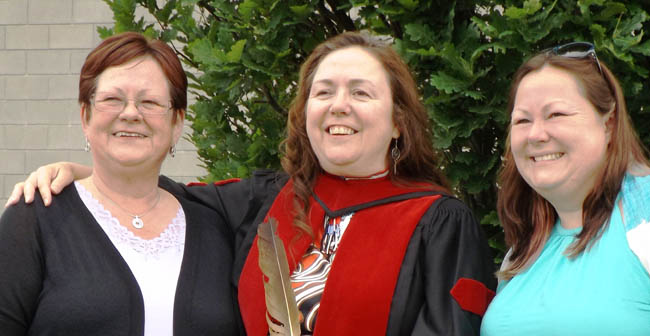Lafleur first Aboriginal PhD for Brock University

By Esther Lafleur Gilbank
Please join me in congratulating my sister Gail Lafleur. We are daughters of Evelyn Goulais Lafleur of Nipissing First Nation. Gail has had a lot of firsts in her lifetime; she is the first of six children in our family to graduate high school, college, and university. She was also the first person to work as the First Nation Student Advisor at Brock University and now, she is the first Aboriginal person to ever graduate with a PhD at Brock University with a Doctor of Philosophy in Educational Studies. Raised in Sudbury, Gail moved to Niagara to continue her aspirations in education.
We grew up from very humble beginnings, and I believe she was the first person from our old neighbourhood to ever obtain a graduate degree, probably even a university degree. As a humble person, Gail respects all things, as this is what the Elders teach.
During her most recent academic journey, Gail has experienced both challenges and successes. The big obstacles were common to what many Aboriginal students go through while pursuing their education, which is securing funding and finding time and balance in their lives.
She found the most difficult part was to obtain the necessary funding and resources to complete her work. Most people figure that if you are smart, that will pay the bills. But a PhD student needs to fund their education just like any other student – and being Aboriginal doesn’t guarantee that you will get funding. Gail does recognize and appreciate the support that she did receive from Nipissing First Nation and is thankful to our community. She mentions a special thanks to Fran Couchie, Director of Education.
Largely working full-time during her studies, Gail juggled the stressful combination of school and work, but soon realized the rewards that came with her dedication and sacrifices.
The most rewarding part for her was to be able to work on the area of research that she was interested in most and that could contribute the most. She realizes that her work is one of the very few works which discusses the Anishinaabek contemporary worldview in the 21st century as told by traditional elders, since they preserve our way of knowing and being in the world.
With the support from Nipissing First Nation, family, colleagues, professors, and classmates, Gail appreciates the willingness to learn by those she shares her work with and continues to share a worldview that is, as she describes, “mostly misunderstood and foreign to the way most people see and experience things.”
In moving forward, Gail hopes she can help others attain their educational goals, sharing with them the knowledge and experience she has gained throughout her academic and personal journey.
She hopes to widen the intellectual and professional relationships that she has made and to support our First Nations, especially our home community of Nipissing First Nation, and other Aboriginal students. Gail hopes to publish her dissertation, “Ojibwe Elders’ Experience of Peace: To Teach Our Well-Being with the Earth,” so it can be used as a curriculum resource for students, teachers, and researchers and possibly influence educational policy and government.
This knowledge could also influence invitations of respect to First Peoples and to other cultural worldviews in the education system and to the largess of society. She hopes to work in Aboriginal Programs and Services in Education as an administrator, service provider, and teacher, to affect positive change. This way, we can learn from each others gifts and experiences. Diversity and culture are to be shared and respected by everyone.
As her sister, I am so proud of her achievements. I encourage all students, young and old, to follow their dreams. Her strength demonstrates what education can do, in a good way, along with the gifts given to us by the Creator as keepers of the fire, water, earth and wind. We, as Anishinabek, can share our gifts by way of expressing past knowledge and teachings to the world.


